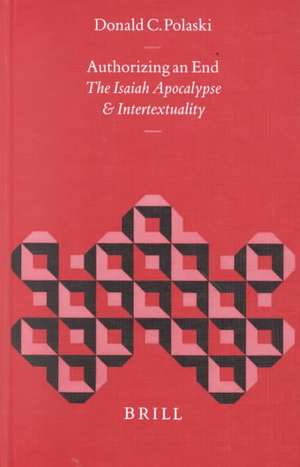Authorizing an End: The Isaiah Apocalypse and Intertextuality: Biblical Interpretation Series, cartea 50
Autor Polaskien Limba Engleză Hardback – 29 oct 2000
The first chapter surveys approaches to late Israelite prophecy and presents a new "intertextual" way of viewing this material. The chapters that follow investigate the "eternal covenant" and its role in intertextual space; Isaiah 25's construal of Israel's relationship to other nations; the central role of the "righteous" in Isaiah 26; and Isaiah 27, which points towards the victory of YHWH’s order over chaos.
Readers interested in the development of Jewish apocalyptic literature, the social arrangements of second-Temple Judaism, and postmodern treatments of biblical texts will find this volume useful.
Din seria Biblical Interpretation Series
- 18%
 Preț: 669.90 lei
Preț: 669.90 lei - 18%
 Preț: 1079.07 lei
Preț: 1079.07 lei - 18%
 Preț: 760.12 lei
Preț: 760.12 lei - 18%
 Preț: 760.12 lei
Preț: 760.12 lei - 18%
 Preț: 844.28 lei
Preț: 844.28 lei - 18%
 Preț: 720.41 lei
Preț: 720.41 lei - 18%
 Preț: 713.43 lei
Preț: 713.43 lei - 18%
 Preț: 795.35 lei
Preț: 795.35 lei - 18%
 Preț: 996.49 lei
Preț: 996.49 lei - 18%
 Preț: 693.56 lei
Preț: 693.56 lei - 18%
 Preț: 825.15 lei
Preț: 825.15 lei - 18%
 Preț: 732.66 lei
Preț: 732.66 lei - 18%
 Preț: 616.77 lei
Preț: 616.77 lei - 18%
 Preț: 604.54 lei
Preț: 604.54 lei - 18%
 Preț: 706.53 lei
Preț: 706.53 lei - 18%
 Preț: 660.89 lei
Preț: 660.89 lei - 18%
 Preț: 732.74 lei
Preț: 732.74 lei - 18%
 Preț: 691.71 lei
Preț: 691.71 lei - 18%
 Preț: 621.40 lei
Preț: 621.40 lei - 18%
 Preț: 807.36 lei
Preț: 807.36 lei - 18%
 Preț: 691.14 lei
Preț: 691.14 lei - 18%
 Preț: 595.44 lei
Preț: 595.44 lei - 18%
 Preț: 892.95 lei
Preț: 892.95 lei - 18%
 Preț: 838.18 lei
Preț: 838.18 lei - 18%
 Preț: 731.10 lei
Preț: 731.10 lei - 18%
 Preț: 717.31 lei
Preț: 717.31 lei - 18%
 Preț: 577.21 lei
Preț: 577.21 lei - 18%
 Preț: 636.16 lei
Preț: 636.16 lei - 18%
 Preț: 700.92 lei
Preț: 700.92 lei - 18%
 Preț: 630.44 lei
Preț: 630.44 lei - 18%
 Preț: 632.00 lei
Preț: 632.00 lei - 18%
 Preț: 777.93 lei
Preț: 777.93 lei - 18%
 Preț: 881.08 lei
Preț: 881.08 lei - 18%
 Preț: 690.92 lei
Preț: 690.92 lei - 18%
 Preț: 731.64 lei
Preț: 731.64 lei - 18%
 Preț: 721.37 lei
Preț: 721.37 lei - 18%
 Preț: 584.78 lei
Preț: 584.78 lei - 18%
 Preț: 919.23 lei
Preț: 919.23 lei - 18%
 Preț: 606.50 lei
Preț: 606.50 lei - 18%
 Preț: 631.60 lei
Preț: 631.60 lei - 18%
 Preț: 605.33 lei
Preț: 605.33 lei - 18%
 Preț: 631.60 lei
Preț: 631.60 lei - 18%
 Preț: 867.85 lei
Preț: 867.85 lei - 18%
 Preț: 716.43 lei
Preț: 716.43 lei - 18%
 Preț: 1191.36 lei
Preț: 1191.36 lei - 18%
 Preț: 783.45 lei
Preț: 783.45 lei - 18%
 Preț: 611.81 lei
Preț: 611.81 lei - 18%
 Preț: 714.17 lei
Preț: 714.17 lei - 18%
 Preț: 716.58 lei
Preț: 716.58 lei - 18%
 Preț: 546.00 lei
Preț: 546.00 lei
Preț: 1191.14 lei
Preț vechi: 1452.61 lei
-18% Nou
Puncte Express: 1787
Preț estimativ în valută:
228.03€ • 234.51$ • 189.17£
228.03€ • 234.51$ • 189.17£
Carte indisponibilă temporar
Doresc să fiu notificat când acest titlu va fi disponibil:
Se trimite...
Preluare comenzi: 021 569.72.76
Specificații
ISBN-13: 9789004116078
ISBN-10: 9004116079
Pagini: 415
Dimensiuni: 162 x 245 x 31 mm
Greutate: 0.89 kg
Editura: Brill
Colecția Brill
Seria Biblical Interpretation Series
ISBN-10: 9004116079
Pagini: 415
Dimensiuni: 162 x 245 x 31 mm
Greutate: 0.89 kg
Editura: Brill
Colecția Brill
Seria Biblical Interpretation Series
Public țintă
Readers of ancient Judaism and Christian origins, and biblical scholars, will find this work useful.Notă biografică
Donald C. Polaski, Ph.D. from Duke University, Durham, North Carolina, is an independent scholar residing in Richmond, Virginia. He has published several articles treating texts from feminist and postmodern perspectives.
Recenzii
'Recommended for all libraries.'
Marvin A. Sweeney, Religious Studies Review, 2002.
'This is an elegant, brilliant, magnificent piece of scholarship, one that refuses to labor in the shadows cast by revered predecessors.'
Michael S. Moore, Bulletin for Biblical Research.
Marvin A. Sweeney, Religious Studies Review, 2002.
'This is an elegant, brilliant, magnificent piece of scholarship, one that refuses to labor in the shadows cast by revered predecessors.'
Michael S. Moore, Bulletin for Biblical Research.
